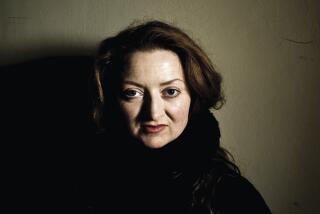Go down, Crowley: The end of “Aegypt”
- Share via
By Ed Park
Though 20 years have passed between the publication of the start and finish of John Crowley’s tetralogy “Aegypt” -- time enough, in publishing terms, for the oeuvre to take on the luster of the “Corpus Hermeticum” whose implications it relates -- only about a year has elapsed in the world of the book. The distant past -- the occult wanderings of John Dee and Giordano Bruno -- has been represented by extracts from the historical fictions of the late Fellowes Kraft, local celebrity in the deliciously named town of Blackbury Jambs, ensconced in the Faraway Hills; and we have been treated to a lengthy look at one episode in the childhood of the series’ central character, Pierce Moffett, renegade scholar or historian manqué.
But well over 1,000 pages separate the day Pierce’s bus broke down at the beginning of “The Solitudes” (originally published in 1987, discussed here last month), landing him in the Faraway Hills, and Rosie Rasmussen’s happy wedding to Brent Spofford (ex-shepherd and Vietnam vet), which appears late in the tetralogy’s final book, “Endless Things” (Small Beer Press: 346 pp., $24).
This supreme elasticity of time isn’t just a perverse joke on (or punishment of) the reader but, rather, the point of it all. “Aegypt” is, among other things, a serious treatment of hermetic themes in Western civilization, including the practice and philosophy of alchemy. Decades ago, Boney Rasmussen, Rosie’s great-uncle and the former director of the mysteriously flush Rasmussen Foundation, sent the novelist Kraft to Europe in search of the philosopher’s stone. Not just a means to turn base metals into gold, the stone also grants immortality -- Boney’s greatest desire. By detailing the lives of characters who barely age over the course of hundreds of beautiful, dense, intensely imagined pages, it’s as if Crowley has crafted the book into the stone itself. (Time in “Aegypt” is as much about life in the hermetically sealed Faraway Hills as it is the real-world years separating the publication of each volume.)
Then, one may ask: Is Crowley God?
“[T]he writer, like God, stands outside of time, and can begin his creation at any moment in it,” he writes.
All the past and all the future are present in his conception at once, nothing is fixed until all of it’s fixed. Then he keeps this secret from the reader, as God might keep His secret from us: that the world is as though written, and erasable, and rewritable. Not once, but more than once: time and again. His power is seemingly limitless, but the catch is that nothing is “fixed until all of it’s fixed,” and Crowley is reluctant to do the fixing.
Toward the end of the previous book in the sequence, “Daemonomania” (2000), something disruptive, indeed queerly disturbing, happens -- or rather, doesn’t. Pierce drives off to find his lover, Rose Ryder, who has fallen under the sway of a cultish Christian sect called the Powerhouse. A novice behind the wheel, he mistakenly fills his tank with diesel at a gas station, causing dramatic damage to the vehicle.
But then we learn that, actually, “it hadn’t happened. At the last second . . . Pierce had noticed that the pump he had chosen was red and the other one blue” and made the correct choice.
In the next paragraph, driving, Pierce cluelessly pulls a lever near his seat, causing the hood to swing up and crack his windshield -- abruptly ending his quest. Two pages later, the incident is said not to have happened at all. Crowley is both displaying his power (any accident can be reversed) and hinting at the artificial nature of it all. Why should the reader think that the adventures of Pierce, his friends and enemies are any more real than those of John Dee and Edward Kelley, as rendered by Kraft? All are characters in novels.
“Endless Things” kicks off with this theme of bifurcation, noting that the Germans used the term “Y-tag” for the day they invaded Poland, signifying “a juncture, a crossroads that could never afterward be returned to.” The letter Y is evoked again and again, as a symbol, as a shape in nature, each instance a reminder that the world is a garden of forking paths, endlessly unrecoverable.
“I think there’s a Y every single moment we’re alive,” says the character Cliff, not the least epigrammatic of “Aegypt’s” many long-ruminating men.
But “Y” isn’t just a prescription for doubt; it can signal freedom. Thus the lamentable death of the heroic heretic Bruno in 1600 turns into a philosophical comedy, as his soul fuses with the body of the ass he rode in on (think Robert Bresson’s film “Au hasard Balthazar” meets “Mr. Ed”). And Pierce himself takes tea with Dame Frances Yates (that “Y” again), real-world author of “The Art of Memory” and other scholarly works that have informed the writing of “Aegypt” -- a delightful scene that is fiction both because Pierce never finds the courage to introduce himself and because it’s all fiction anyway.
The high points of the previous volumes -- the rhapsodic closing pages of “Love and Sleep,” the storybook conclusion to Dee’s adventures in “Daemonomania” -- don’t have an equivalent here. But aside from a few tour book-like patches when Pierce follows Kraft’s old itinerary, “Endless Things” is a remarkable performance, multidirectional yet easier to hold in the mind.
Considerably shorter than its predecessors, this novel has a loose, at times almost improvisatory feel, as characters heretofore unmentioned (Kraft’s mother!) come into sharp focus (was in a cult!) before blending back into the tapestry. ( Harold Bloom, Crowley’s great champion, even gets a cameo.)
Shakespeare’s “Tempest,” that last act to end last acts, rumbles through “Aegypt’s” finale, and though that must mean Crowley is pulling a Prospero and giving up his tricks, he still manages to fling wonder after wonder our way. (One of many: Pierce’s wife, new to this book though actually glimpsed in “The Solitudes,” thrills at the sight of crows, totemic to her surname, Corvino; the fact that the same bird perches on our author’s last name instantly complicates everything.) The “Aegypt” cycle has always been about its own slow process, its private alchemy, its impossibility, but in the brisk “Endless Things” Crowley dismantles the machinery while dazzling us, showing how each part gleams.
The title, taken from a complaining phrase of Kraft’s mother, points to the book’s valedictory status. I would have loved it if, like Kraft’s last manuscript, “Endless Things” ended midsentence, a gesture of incomplete completion. “Beginnings are easy,” Crowley writes. “So are continuings. It’s endings that are hard.”
Perhaps, in this copious world of words, in which women share names and the mystical Jewish practice of gematria reveals the secret, numerical linkages between groups of letters, Crowley has found a way to stop short of stopping. For “Aegypt” begins a thousand and a half pages ago with the “angels in the glass” that Dee attempts to view: “All their names began with A.” And the cycle ends with this radiant book devoted to the branching possibilities of Y.
By my alphabet, we’re not quite at the end yet.
*
Ed Park is an editor of the Believer. His Astral Weeks column appears monthly, and his novel “Personal Days” is forthcoming from Random House.
More to Read
Sign up for The Wild
We’ll help you find the best places to hike, bike and run, as well as the perfect silent spots for meditation and yoga.
You may occasionally receive promotional content from the Los Angeles Times.










